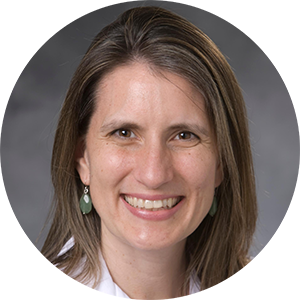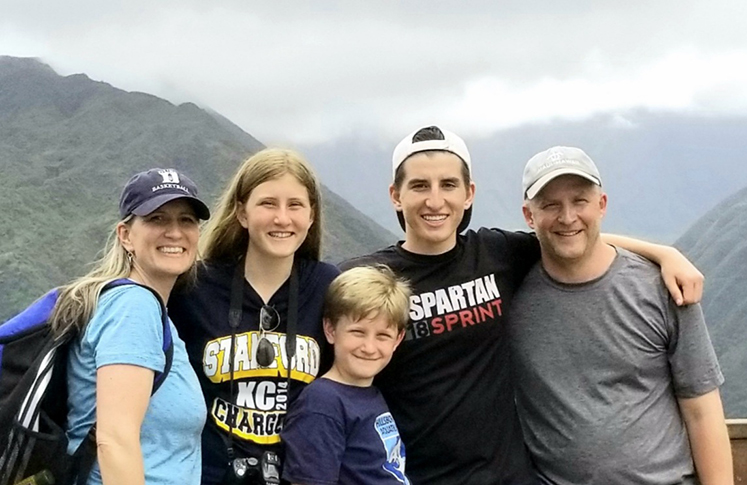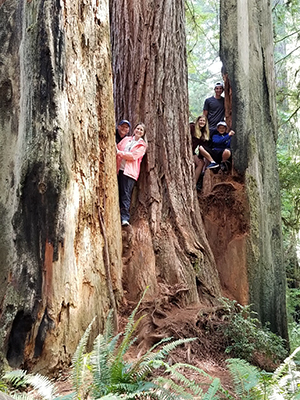
Heather Van Mater, MD is a pediatric rheumatologist, with a particular affinity for the central nervous system. In this week’s Spotlight interview, she talks about her role as co-director of the Pediatric Autoimmune Brain Disease (ABD) program, where she works closely with colleagues in neurology and psychiatry. She also talks about how she became interested in medicine and her current research focused on autoimmune brain diseases. She shares what she most enjoys about her work as well as her passions outside of Duke and offers some advice for trainees.
How long have you been at Duke? How did you decide to come here?
I started at Duke in July of 2009 after finishing my fellowship at the University of Michigan. My husband and I were looking for an academic medical center with strong divisions of both rheumatology (for me) and pediatric hematology/oncology (for him to do his fellowship). Additionally, we wanted to live in a family friendly place to raise our three young children and be near our families. Duke was the perfect match! We stayed because we love the comradery and collaboration in the department. And, coming from Upstate New York and Ann Arbor, the warm weather and sunshine didn’t hurt either!
What are your current responsibilities within the Department of Pediatrics? What does your typical day look like?
I am a pediatric rheumatologist, with a particular affinity for the central nervous system. I am co-director of the Pediatric Autoimmune Brain Disease (ABD) program where I work closely with colleagues in neurology and psychiatry seeing patients in clinic twice a week and co-managing inpatients with autoimmune conditions such as autoimmune encephalitis and CNS vasculitis. I spend the other 3-4 clinics a week seeing children and adolescents with more “traditional” rheumatic diseases and rotating on our inpatient consult service. I am engaged in clinical research primarily with the ABD population as we work to better understand disease classification and optimal treatment strategies. The other part of my time is spent as Program Director for the Pediatric Rheumatology Fellowship where I have the privilege of working with our amazing fellows!
How has the COVID-19 pandemic affected your work? What’s one strategy you and your colleagues have used to adapt or compensate?
As with most divisions, we had to quickly determine how to best care for our patients. Most of our patients are on immunosuppressant medications, so we faced many challenges navigating when and if to alter treatments, how to communicate with our patients efficiently when recommendations were rapidly evolving, and how to provide virtual care in a subspecialty that relies heavily on the physical exam. I was initially skeptical of being able to adapt our exam to a virtual platform, but I have to admit, I have been pleasantly surprised by how much you can see with a visual musculoskeletal exam! We have really embraced this method of caring for our patients, many of whom travel hours to be seen, and we are now rethinking how we can utilize telehealth to maximize patient care going forward when things return to “normal”.
One of the most inspiring results of the pandemic has been the collaborative spirit and sense of urgency that seemed to make the impossible, possible. The pediatric rheumatology community has adapted by working together, developing international collaboratives, building registries, sharing real time information, and developing cross discipline working groups to tackle the challenges we all face. It has really highlighted how much we can accomplish when there is a willingness to think about problems differently and to try new things.

How and when did you initially become interested in medicine and pediatric rheumatology in particular?
I can’t remember a time when I didn’t want to be a doctor. I always loved hospitals, likely in part because as the second of 8 kids, for years I didn’t know they were for anything but having babies! Being a kid at heart, I entered medical school quite certain I wanted to be a pediatrician, but rheumatology was not on my radar until after I did a rotation in the winter of my third year of residency. I loved the complexity of the diseases, the need to put the pieces together to reach a diagnosis, and the inherent collaborative nature of a specialty with mult-isystem diseases.
Is there any research or special projects you are doing or plan on doing?
Most of my research is focused on autoimmune brain diseases, including how to make a diagnosis, distinguishing characteristics, and determine optimal treatments. We have several active projects, including a prospective study with sample collection to look for novel biomarkers of disease activity. I also participate in our divisional studies, the largest being the national registry for children with rheumatic disease through the Childhood Arthritis and Rheumatology Research Alliance (CARRA), as well as industry supported clinical trials.
What do you enjoy most about your work?
The kids--we have the best patients! I am inspired by our kids and their families as they navigate the challenges of chronic disease and show such grit and perseverance. I am also incredibly grateful for the people I work with and the collaborative spirit at Duke--from our amazing nurses and office assistants to my colleagues both within and across the divisions in our department. I am especially fond of one of the pediatric oncologists.

Who was your most significant mentor and what knowledge did you gain through this collaboration?
While I have had many excellent mentors, Dr. Barbara Adams was the pediatric rheumatologist who introduced me to the field and inspired me to think broadly about the role of a rheumatologist. She was a master clinician who started practicing rheumatology at a time when it was just establishing itself as a subspecialty. She taught me so many “pearls” from her decades of learning from her patients, many of which I continue to pass on to my fellows--who are quite familiar with the phrase, “well, my mentor Barbara taught me”.
Do you have any advice for trainees?
Be open minded. Sometimes that consult you don’t know why you are seeing can teach you the most, or the rotation you were randomly placed on can turn out to be your true passion. Always look for opportunities in areas you are interested in, but don’t miss the ones that are a little outside the box--be willing to take a risk and stretch the boundaries.
What passions or hobbies do you have outside of Duke?
I love spending time with my amazing husband and 3 children--which is a good thing given the last 6 months! Pre-pandemic, I spent much of my time as an unpaid Uber driver transporting my kids to all their events and cheering them on from the sidelines. I have a gift for loudly and enthusiastically cheering for the exact wrong thing--shoot when they should pass, go when they should stop. Since the pandemic I have been working on my culinary skills with my new culinary crush Thomas Keller--who won my favor during his lesson on making pasta when he stated that he “is not opposed to buying dried pasta…if its more convenient...there are some great pastas in the local markets”. Sold!